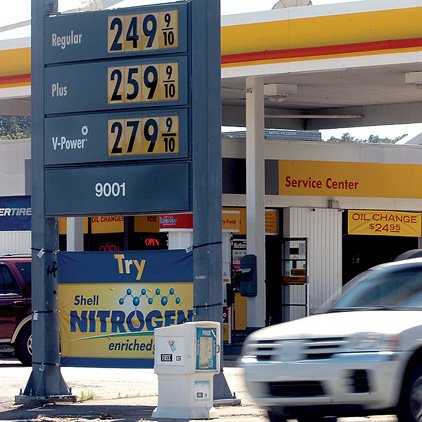LITTLE ROCK — The average price of a gallon of regular gasoline in Arkansas has risen $1 since the beginning of the year.
The rate of increase from Jan. 1 to June 5 was steeper than the rate of increase during the similar period last year - 68.2 percent this year compared with 29.5 percent in 2008 - even though prices were higher then.
AAA reported Friday that regular gasoline averaged $2.474 in Arkansas, up 12 cents in a week and nearly 50 cents in a month. Gasoline cost $1.471 per gallon on average Jan. 1.
While that's not as bad as last summer, when prices reached $3.826 a gallon on June 5 and a high of $3.972 in July, Shawna Paine said every price increase affects her budget.
Paine, 29, who lives in Alexander recently bought a 2001 Toyota Camry with gas mile-age in mind after her 11-year old Ford Taurus bit the dust. She now gets about 400 miles to the tank, which she described as "fabulous."
It cost her $38 - at $2.39 a gallon - to fill up in Bryant on Thursday.
The Campus Crusade for Christ staff member said she's on a tight budget and that living outside Little Rock means a lot of driving.
"It definitely makes things tighter," she said.
Last summer, she had to change the way she shopped for groceries and ate out, she added.
Paine and other drivers can expect gasoline prices to keep going up in the near term, experts said.
"For now, the money is still flowing into energy futures in general, and gasoline futures to some extent in particular," said Tom Kloza, director of Gaithersburg, Md.-based Oil Price Information Service.
But Kloza believes that gasoline prices are peaking.
"Of course, last year saw a lot of false peaks as well, and wholesale prices eventually peaked on June 16, followed by a retail peak around July 11," Kloza wrote in an e-mail. "This year should see an earlier peak, but probably not the slide that occurred in the second six months of 2009. Or, I could be wrong."
The upward price pressure comes mostly from the price of crude oil, which has gone from a low of $33.87 a barrel in December to close at $68.44 Friday on the New York Mercantile Exchange.
Phil Flynn, vice president and energy analyst for Chicago-based Alaron Trading Corp., said a big part of the rise in the price of crude can be pegged to inflation of the dollar. The government is spending record amounts of money, and we're seeing inflation develop in front of our eyes, he said.
In addition, oil companies have cut back on new product development because of the crash of the commodities market last year. That means that if and when oil demand picks back up, there could be a shortage, which pushes the futures prices up further.
Futures prices immediately affect prices at the pump because retailers need to be able to afford their next load of fuel.
Mark Cooper, research director for the Consumer Federation of America, said he thinks that part of the price increase stems from speculators coming back after being driven out of the market during the crash. The federation, a 41-year-old nonprofit, provides advocacy, research and education on proconsumer issues, according to its Web site, www.consumerfed.org.
"No one can see the fundamentals that would justify this kind of increase," Cooper said. "What you're getting at the pump is the pass-through in the run-up of the oil."
Those speculators are largely blamed for crude oil reaching $147 per barrel last summer, causing Arkansas' peak average price just shy of $4 on July 17.Then, the commodities markets slowly collapsed, dragging the price of gasoline down except for hurricane-related shortages and subsequent spikes in September.
Gasoline prices in the state reached a near five-year low on Jan. 1, at $1.471.
Refiners also have contributed to the gas-price increase by slowly reducing gasoline supplies because of low demand and profitability, said Tom Knight, vice president of supply and trading for Texarkana, Texas-based Truman Arnold Cos.
Refiners lost money in November. They had to greatly lower rates of production to start to push their margins back toward profitability. And margins remain very low - a net of about $2 a barrel of gasoline.
Gasoline stations usually collect only a few cents a gallon in profits, Knight said. For example, in Texarkana, the gross retail margins are about 6 cents, but credit cards take about 4 cents of that, Knight said. And wholesalers, because of intense competition, can usually collect only a similar margin of a few cents.
While the Energy Information Administration predicted a peak gasoline price of about $2.30 a gallon for the summer driving season, which runs from April through September, it now looks more likely that it'll be $2.60 or $2.70, said Mike Right, a spokesman for AAA.
Demand is picking up and gasoline supplies are not nearly as plentiful as crude, which points to a further tightening of inventory and higher prices, he said. But it's impossible to predict gasoline prices in this fluctuating market.
As the price of gasoline has risen, the cost of diesel sank below gasoline on May 11 for the first time since mid-2007, according to the Energy Information Administration.
Before 2005, diesel prices typically dipped below gasoline for the summer season as gasoline demand increased and winter demand for heating oil and other distillates dropped. But strong economic growth before the current recession put more pressure on diesel prices as more goods were shipped, pushing diesel prices above those for gasoline. Europe's shift to diesel for cars also increased demand, according to the agency.
The slow economy has affected diesel more than gasoline, pushing prices lower, the agency reported, and diesel is returning to its old pattern.
Diesel averaged $2.381 in Arkansas and $2.478 nationally Friday, according to AAA.
Front Section, Pages 1, 3 on 06/06/2009

